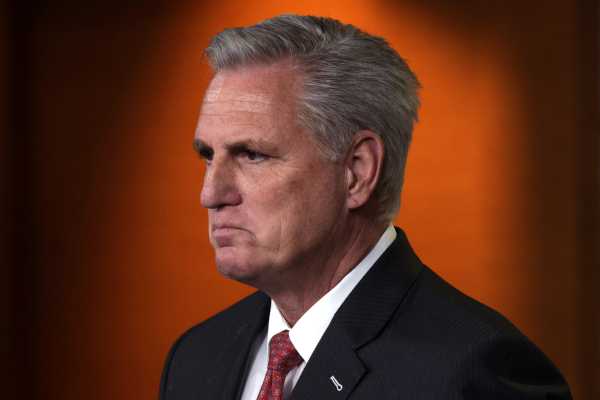
Kevin McCarthy has long wanted to be speaker of the House, and will likely be one step closer to that goal following Tuesday’s House GOP leadership elections. But the strategy he’s employed to realize his dream may turn it into a living nightmare.
He spent the better part of the past two years crisscrossing the country in order to ensure that Republicans won a majority in the House of Representatives in the 2022 midterms. As the House Republican leader, he’s gone to rubber chicken dinners and fundraisers with buffet tables stacked high with shrimp cocktail across the country. He’s spent countless hours on the phone recruiting candidates and soliciting donations. As a result, he and his allies entered the midterms with about half a billion dollars to spend and a slate of candidates Republicans were excited about.
He’s also had to walk a tightrope, trying to keep all factions of his party happy, balancing the needs of swing-district moderates with the desires of far-right Trump devotees. McCarthy excoriated former President Donald Trump on the floor of the House a week after the January 6, 2021, attack on the Capitol. Only weeks later, he went to Mar-a-Lago to mend fences and pose for a photograph with Trump.
In the most literal sense, McCarthy succeeded. Republicans are almost certain to hold an absolute majority of the 435 seats in the House of Representatives in 2023.
But, he may still end up falling short of his ultimate goal of becoming speaker. Republicans are likely to have one of the smallest House majorities in recent history, made up of members with diverse ideologies and varying personal allegiances to McCarthy. The challenge for the California Republican is whether he can successfully tame the most recalcitrant members of his conference and get the 218 votes necessary on the floor of the House in order to achieve his long-cherished goal.
Who is Kevin McCarthy?
McCarthy has been the leader of the House Republicans since 2019, after then-Speaker Paul Ryan decided not to run for reelection to Congress after two tumultuous years under President Trump. A Republican from Bakersfield, California, McCarthy was first elected to Congress in 2006, succeeding longtime incumbent Bill Thomas. McCarthy had been a staffer for Thomas before becoming a member of the California State Assembly, where he became minority leader in his first term.
In Congress, McCarthy rose to power as a “Young Gun.” Along with Eric Cantor, who was then-Majority Leader John Boehner’s second in command, and Paul Ryan, McCarthy was seen as a rising GOP star. In 2014, after Cantor’s shocking primary loss, McCarthy became House majority leader, and in 2015, when Boehner resigned as speaker after a half-decade of frustration trying to manage the fractious Republican conference in the Tea Party era, McCarthy was poised to replace him.
But McCarthy faced a rebellion on the right, amplified by a gaffe he made on Fox News, where he boasted about the damage that the select committee on Benghazi was doing to Hillary Clinton’s poll numbers. McCarthy withdrew from the contest and remained majority leader while Ryan eventually became speaker as a consensus candidate.
Now, if he can hold his conference together, he’s poised to finally become speaker himself.
What does McCarthy need to do to become speaker?
The simple answer is: get 218 votes on the floor of the House in January. Speaker of the House is one of a handful of offices explicitly named in the Constitution, and it is elected by the entire chamber.
But it may not actually be that simple. While there will almost certainly be at least 218 Republicans in the House next year, as of now, there may not be 218 Republicans willing to vote for McCarthy on the floor.
McCarthy is expected to handily win a vote within the Republican conference to be their party’s choice for speaker on Tuesday. The question is how many members back Rep. Andy Biggs, the Congress member from Arizona just elected to a fourth term, who is expected to run as a stalking horse for members of the hard-right Freedom Caucus.
Tuesday’s initial vote will allow both McCarthy and his critics to put their cards on the table — and allow for nearly two months of wheeling and dealing.
The narrow Republican majority gives McCarthy’s critics a lot of leverage; he needs their votes to become speaker and it gives them the power to make demands of him.
Most of those opposed to McCarthy are in the Freedom Caucus, which will have roughly three dozen members in the next Congress. Their demands largely involve a variety of changes to House procedure that would weaken the speaker and empower rank-and-file members.
Going back to John Boehner’s tenure, rank-and-file right-wingers have griped that establishment Republicans in leadership have ignored them to reach bipartisan deals that have been insufficiently conservative. The dissidents in the Freedom Caucus want to change the rules to prevent this from happening in the future.
The most freighted proposal offered by conservatives is changing the House rules on who can offer a motion to vacate the chair — essentially, who can trigger a vote to remove the speaker and hold elections for a new one.
Until recently, House rules allowed any member to offer the motion. It was through this parliamentary procedure that Rep. Mark Meadows, who went on to become Trump’s chief of staff, forced Boehner out in 2015.
After Democrats took over the House in 2017, they changed the rules so that only members of either party’s leadership could offer the motion. McCarthy’s opponents want to change that, which would give them significant leverage — particularly in such a closely divided House.
Other changes they want would give rank-and-file members more influence over who becomes a committee chair and how members get assigned to committees.
Will McCarthy actually become speaker?
At this point, there is still a broad range of possibilities for what happens when Congress votes on the next speaker on January 3.
After all, we still don’t know just how slim the Republican majority will be, or who will be in it. Further, for all the attention paid to the Freedom Caucus, there is an equally numerous bloc of moderates within the House Republican Conference who are already looking askance at the efforts to change the rules.
All that said, it’s been 100 years since an election to choose the speaker has required multiple ballots, and while McCarthy may have issues getting 218 votes from House Republicans, it’s unclear if there is anyone who would do any better. Other members of leadership, like current House Minority Whip Steve Scalise, would face the same resistance from the hard right, whereas a Freedom Caucus ally like Rep. Jim Jordan might cause a backlash from moderates.
And Republicans, no matter how they feel about McCarthy, do have an incentive to fall in line. There is always the looming alternative that a handful of Republicans could unite with Democrats voting as a bloc to pick someone far more distasteful to the right than McCarthy. As Rep. Marjorie Taylor Greene worried in an interview on Monday, “Do we want to see that challenge open the door to Pelosi handing the gavel to [someone like] Liz Cheney?”
Then again, McCarthy has fallen short of being speaker once before.
Sourse: vox.com






